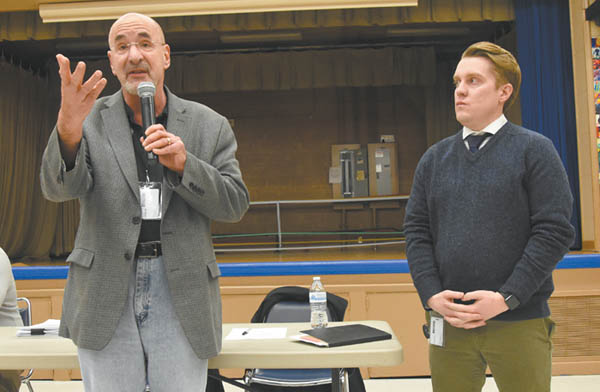‘Brief’ reveals city’s actions, plans, ideas on homelessness
 Richard Skorman (left), Colorado Springs City Council president and representative of District 3 (including much of the Westside), answers questions from the audience with Andrew Phelps, the city homelessness prevention and response coordinator, at a January public meeting in the Westside Community Center on issues of vagrancy and homelessness. Westside Pioneer photo
|
The authors are Richard Skorman, Colorado Springs City Council president and representative of District 3, which includes part of the Westside; and Andrew Phelps, the city homelessness prevention and response coordinator.
Over 2,500 words long, the Brief claims 14 areas of “success” in fighting homelessness and helping people rise from it, through efforts by the city working with local nonprofits, and identifies plans or ideas to do more, including copying “best practices” used in other places. A prominent change will be the construction of 115 rental-type units elsewhere in Colorado Springs - 65 of which will open in 2019 - including “wrap-around services” for “chronically homeless people.”
The writers also describe the intent to spend more money on the issue (including hiring more city employees) and to seek additional help from grant requests and local hospitals and churches.
No new public taxes are proposed, but Skorman and Phelps point out that the city “will be assessing direct and indirect costs to city and taxpayers via the evaluation of CSPD and CSFD calls to service, Neighborhood Services, Homeless Outreach Team, garbage contract with haulers, Keep Colorado Springs Beautiful, as well as other city costs associated with homelessness.”
The Brief recognizes there are different points of view - those who believe not enough is being done to help such people and others who believe that “homeless agencies do too much enabling and that many people abuse the system.”
The authors do not dispute the Department of Housing and Urban Development policy that homelessness is a “status,” not a “behavior,” saying this is so even for people unwilling to accept help - described in the Brief as those who “prefer to camp to protect their belongings; maintain independence, use substances, and... cannot mentally adapt to the shelters.”
The predominant term in the Brief for all types of people without housing is “those experiencing homelessness.” The cause is defined as a “deficit in transitional, affordable, permanent supportive, workforce, and senior housing”
Here are highlights from the document:
The Brief also points out that city law against camping overnight in public (which was passed in 2010) is now being enforced with a 24-hour notice to campers (it used to be 48). However, enforcement does not occur when local shelters run out of beds. The Brief notes that this policy is based on a “Department of Justice brief written in 2015.”
Because this means the camping issue is not going away, the Brief:
- Calls for dumpsters to be placed “at strategic sites with the hope that this will aid in the ongoing cleanups happening daily in our community as well as to encourage those experiencing homelessness to clean up.”
- Expresses a “hope to organize placement of portable bathrooms in key locations.”
- Outlines a plan in which private money would pay people “to help clean up camps and prepare them for job applications.”
- Announces that Neighborhood Services (formerly Code Enforcement) is working with the City Police Homeless Outreach (HOT) Team in “identifying and cleaning up camps [and] is working diligently to facilitate large garbage collection at homeless camps,” including roll-off dumpsters “at strategic sites.”
- Notes an intent to hire two more HOT Team members (there are four now) and “to secure a grant to pay for a mental health professional to be assigned to each HOT Team member.”
Westside Pioneer article
Editor’s note: The “Homelessness Brief” in its entirety is posted at westsidepioneer.com/ Articles/042318/GuestColumnSkorman&Phelps.html.